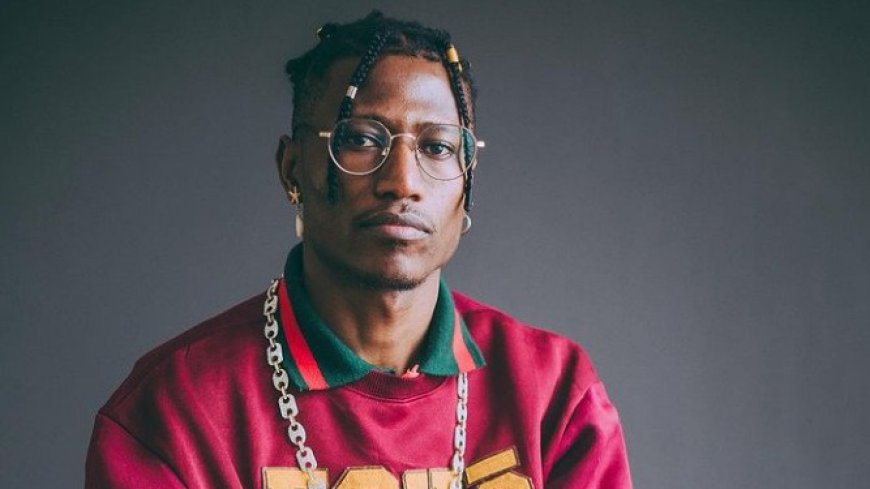George Ruto Is Not The Enemy: Musician Defends 'Mood' Matatu
Uproar ensued online after George held a concert at the Kenyatta International Convention Centre (KICC) on Friday night to mark the debut of his Ksh14 million matatu, an event which, free of charge, drew thousands of young people.

Kenyan rapper Henry Ohanga alias Octopizzo has weighed in on the heated conversation that surfaced in the aftermath of the grand unveiling of 'MOOD', a brand new flashy matatu owned by President William Ruto's son, George Ruto.
Uproar ensued online after George held a concert at the Kenyatta International Convention Centre (KICC) on Friday night to mark the debut of his Ksh14 million matatu, an event which, free of charge, drew thousands of young people.
The event featured a short prayer session and the anointing of the matatu, after which a full-scale entertainment concert was held for the youth. The young people gathered at the KICC to show support for the President's son and celebrate matatu culture.
After the concert wrapped up, activity in the CBD briefly came to a halt as the matatu made a short drive through the city centre.

Photo of rapper Octopizzo. /MDUNDO
Hundreds of young people trailed the matatu, leading to heavy traffic jams in the area that stretched late into the night. The chaos created unease among Nairobi residents heading home, with some reports cautioning locals to watch out for potential goons.
Much of the criticism was directed at Kenyans who attended the launch event amidst the Head of State facing his own backlash over the rampant abductions, extrajudicial killings and overall bad governance, with online users demanding that Kenyans 'cancel' those who were in attendance.
However, Octopizzo, in a statement on his X account on Saturday, July 19, remarked that the huge presence and hype surrounding the 'nganya' matatu was evident of how matatu culture in Kenya has evolved over the years from being merely a means of public transport to a thriving ecosystem of art, music, design, and entrepreneurship.
"From graffiti artists and sound engineers to digital content creators, DJs, and custom interior fabricators, the industry is creating real, tangible jobs for thousands of young people. What was once seen as chaotic and informal is now being recognized as a hub of street creativity, innovation, and cultural identity," he stated.
However, the Noma Ni hitmaker outlined that this did not mean that the matatu culture was in support of the Kenya Kwanza government and that the real enemy was its poor conduct and murderous tendencies, not George Ruto.
"It’s important, however, to make a clear distinction: while individuals like George Ruto support and appreciate matatu culture, this doesn’t automatically mean the culture endorses the political regime," he went on.
"The Enemy is not George, the enemy is bad governance and killer government. Ma3 Culture is a reflection of the people,complex, independent, and often resistant to co-option."
Octopizzo nonetheless supported George's efforts in rallying behind a long-standing culture that he says he is genuinely passionate about and understanding of. According to him, "His support represents a bridge,not control and it’s a sign of progress when leaders recognize and celebrate the raw, authentic expressions of Kenya’s urban youth."
The rapper urged Kenyans to focus on the creative milestone that has defined Kenya's modern culture instead of reading political undertones in every move. "Tuache feelings kidogo na tu celebrate culture (let's stop being emotional and celebrate the culture)," he concluded, calling for two of his tracks to be played in the new nganya; June 25th and Noma Ni.
Mood marks a fresh chapter in Kenya’s matatu culture, standing out as the first of its kind thanks to its unique features. The vehicle is said to have cost Ksh14 million and carries a customised number plate reportedly cleared by the National Transport and Safety Authority (NTSA).
Passengers on board can expect custom-designed bucket seats, each equipped with a cup holder and charging port. The matatu is also fully air-conditioned—offering a sharp contrast to the cramped, stuffy conditions typical of most public service vehicles.
As Kenya leans further into its distinctive urban subcultures, events like this ignite crucial discussions around identity, ownership, and the role of youth in shaping national narratives—not through politics alone, but through art.
At the end of the day, whether you're boarding a matatu for the music, the energy, or the iconic graffiti, one thing’s certain: the streets have a voice—and Kenya is paying attention.







